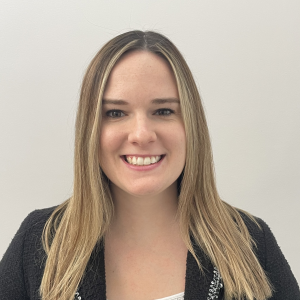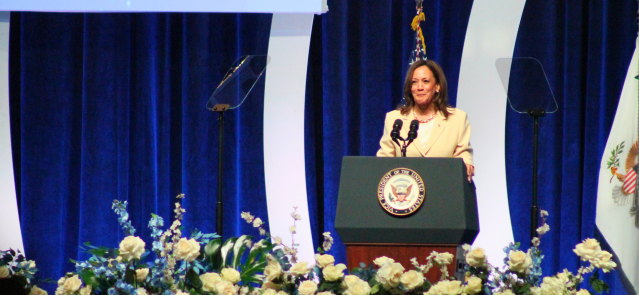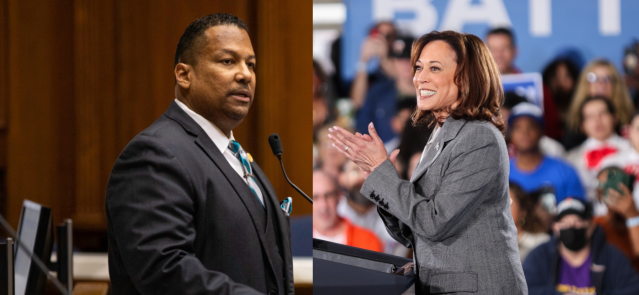Stay ahead of the curve as a political insider with deep policy analysis, daily briefings and policy-shaping tools.
Request a DemoAuditor Tera Klutz talks about staying out of politics and her plans to change the office’s name
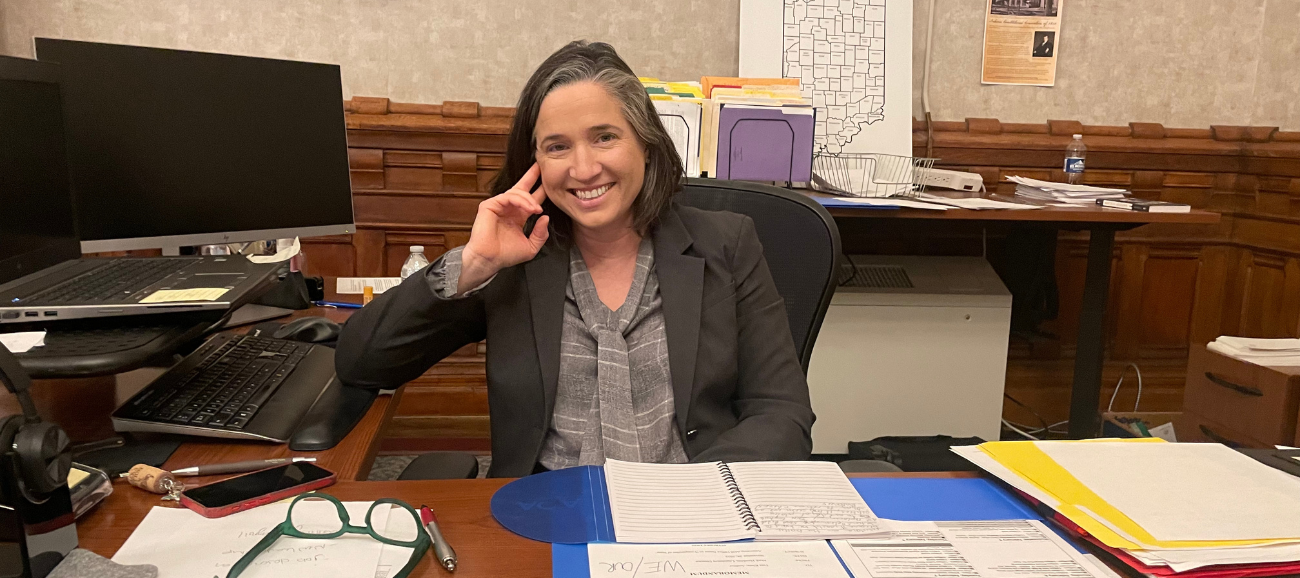
State Auditor Tera Klutz talks with State Affairs. (Credit: Kaitlin Lange)
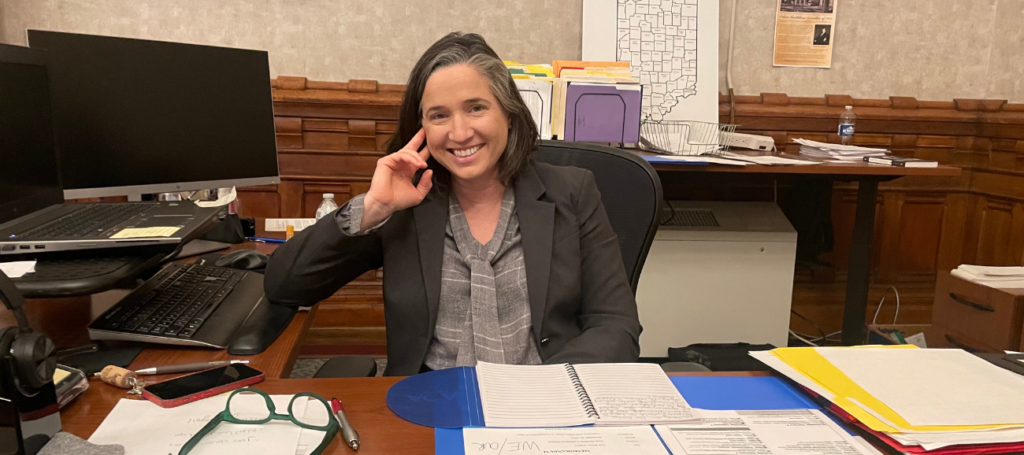
Tera Klutz is unlike other statewide elected officials in Indiana: She tends to stay away from social media, never intended to run for office in the first place and doesn’t have any plans to seek another elected position after her term as state auditor is over.
When State Affairs arrived at her office for an interview about a month into her final term in office, there was no communication expert tagging along. Klutz, who was first appointed to the office by Gov. Eric Holcomb in 2017, came armed with a notebook full of talking points she wanted to mention about her office.
Her mostly apolitical nature seems to have paid off. Klutz, the state’s chief financial officer, was unopposed at the Republican convention in June and then, once she became the Republican nominee, won her general reelection bid by nearly 24 percentage points in November.
State Affairs spoke with Klutz this week about her plans to change the name of the auditor’s office, how she avoided the Republican infighting in Indiana during her latest campaign, the impending property tax jumps and whether she would support any particular candidates during the 2024 gubernatorial race.
The interview has been edited for brevity and clarity.
Q. You first landed the state auditor position because you were appointed. Would you have ever run for the position had you not been appointed initially?
A. I don’t want to ever say ‘never,’ but every bone in my body says, ‘No way.’
Q. Why is that?
A. The idea of campaigning and all that goes into a statewide campaign with asking for money, spending money, selling yourself, is generally hard to do. It’s a lot easier if you are already in the job, because you have a very good sense of, in order to keep this job and keep doing the job that I love. I need to make sure to get the message out on what our plans are, what we are doing for taxpayers and what we are doing for the state of Indiana. I can’t campaign in the Statehouse, but it still felt like when I was out on the road, I was still doing the job of state auditor.
Q. When you ran in 2018, you had an ad poking fun at the idea of how exciting you found the auditor’s office to be, but when most people hear the term “auditor,” their eyes kind of glaze over. Do you think your job is actually exciting?
A. I absolutely think my job is exciting, and I love it. I do believe that if I’m doing it well, rarely will anybody care about it. People expect their government officials to use their money wisely, to be transparent and to act responsibly.
I’m one of those back office functions for the state of Indiana that doesn’t need or usually get the notoriety, because we’re behind every bill, we’re behind every employee, we’re behind all the accounting and reporting. I love helping people and solving problems.
Instead of eyes glazing over when I say state auditor, a lot of times [people] literally just want to run the other way, because they’re thinking, ‘Well wait, are you going to audit me? Are you going to audit my company?’ Or if it happens to be a state agency, they’re like, ‘Are you going to come and audit my books?’ I think that’s some of the confusion I’m trying to quell with the title ‘state auditor.’
Q. Speaking of that, I saw that you want to change your office’s name to “state comptroller” in the budget bill.
A. Which, I will equally say, is probably just as confusing. I don’t expect people to know what a state comptroller is, but I do believe it quells a little of the confusion around the job function of auditing. They will not assume that I would audit the state or audit other local governments, because that’s a safe assumption in today’s time. So I think that state comptroller at least doesn’t push them down the audit lane. If they don’t have an idea of what that means, and I don’t expect that they do, then we can have that discussion without any preconceived ideas.
Q. My understanding is that the office would still be called auditor on the ballot unless you seek a constitutional change. Do you think that will just confuse people more?
A. Our office was prepared to go down the constitutional change [route], because that is what the constitutional office is: state auditor. However, when we spoke to a few legislators, they were playing out the scenario where they could see it passing both separately-elected legislatures, but when it came to the public, the perception of removing ‘state auditor’ for ‘state comptroller,’ they felt, would be a hard hurdle to jump over in our polarizing politics. Like, ‘Oh, you’re deleting your state auditor.’
I didn’t think about that until they brought that up, and I can see their point. They also offered another opportunity to achieve a name change without having to amend the Constitution by doing a ‘doing business as’ or ‘shall also be known as,’ so that anybody running on the campaign trail and in this office can have both names.
Yes, that is a little confusing, but I believe that by having the ‘shall also be known as’ will allow the person who wins after this to operate the Office of State Controller [in a way that nobody will] reach out and contact us because they think we audit the state.
Q. How would you describe what the auditor’s office does?
A. I wrote this: Our primary role is to perform the financial operations for the state government as well as report on those operations. [That includes] paying 30,000 people, issuing billions of dollars and millions of payments every year. We produce the financial reports, but we also collect and disperse revenue and fees that we collect on behalf of locals. Local income tax, we collect that. We disperse that out to the locals. Same with excise tax, gaming tax.
We oversee the property tax process here. A secondary role that we have is we administer the state’s 457 plan. It’s a supplemental retirement savings program, so that employees can save their own money on top of their pension if they want.
The financial function in state government is kind of split between the treasurer and the auditor. The treasurer, as the chief investment officer, has the cash and all the investments. My team and I have zero access to that. But the treasurer and his team have zero access to use it unless we issue a payment. So it’s a constitutional check and balance, and we do that every month and it makes it a little harder to steal it. We would have to collude.
Q. When you ran in 2018, the big news was that you were the first certified public accountant to serve as state auditor. How has that helped you in this role?
A. It has helped me because that’s 100% what my college degree trained me for. Accounting is a technical degree. It’s a problem-solving degree. It’s not two plus two equals four. It’s two minus five minus seven times 10. It’s this huge equation, and that’s exactly what government is. In the accounting arena, I specifically learned how to produce financial statements and what internal controls are. I learned how to do payroll and write about it and report on it in a manner that people can understand.
That was a four-year degree. Then I went to work for public accounting, where I was auditing governments and private sector companies, manufacturers.
[My husband] had dabbled in politics. He’s the one who liked it. I voted every year, but I didn’t participate in any political activity outside of voting before I took the chief deputy auditor job in Allen County. My predecessor at that point was the clerk running for county auditor against the chief deputy auditor of Allen County. She campaigned on hiring a CPA as her chief deputy. So we had lunch one day because [my husband] Zach was running the Allen County party under Steve Shine, so they knew I was a CPA. And if she won her primary, I would come work for her. I started in ‘03.
That was the year we changed the way we assessed property, from cost less depreciation to market value and use and that was my first month in. No one was ready to do a property tax bill. In fact, none of the 92 counties had an on-time property tax bill that year, and I got to step into it. I think it was a blessing not to have the past in my mind. I could just grab the new law, the new calculation, and try to figure out okay, so are we going to send a provisional bill? Each county had to decide.
It was a rewarding experience, and I realized I had a passion for it. I didn’t know [I would run for office]. My boss would be term-limited after eight years so I ended up running [in 2010], and then I was going to retire after my last term.
I didn’t even go to the convention in Fort Wayne in ‘14. It’s embarrassing to say. I wasn’t going to have another election. Let somebody else do that stuff. They enjoy it, and I trust them. I went to the Kenny Loggins concert on Sunday night afterwards, but I was bummed I missed [the convention] because that’s when Kelly Mitchell won. It was a contested state treasurer race, and I felt like just having that experience would have helped me prepare for the last convention, because my first one was uncontested completely.
Q. You don’t seem very political. How have you managed to avoid some of the politics? I went to the Republican convention this year and noticed you spoke highly of Gov. Eric Holcomb, but you were also in campaign commercials with now Secretary of State Diego Morales (who ran against Holcomb’s Secretary of State nominee Holli Sullivan). I’m curious how you avoid infighting.
A. I also, on that stage, held their hands afterward.
I tried to pay attention to only the facts. Where’s this information coming from? Is this a credible column? Is it an opinion column? Is it a gossip column? I was trying not to get swayed, because we deal in facts and I’m generally a black-and-white person. My accounting problem has an answer at the end.
So this whole room of politics, and even government and assessments and taxes, there is a little tiny bit of gray that I’ve been able to try to work through, but I know that [because of] feelings and egos, things can get said in moments when you can be personally attacked. All of that is not healthy and it’s not good, and you open yourself up to that every single time you put your name on the ballot.
I had decided I was staying out of all of that.
I’m not a big social media user, because I feel like not only does it take time away from productivity, it also allows the people on the other end to define the narrative that’s in your mind, and that’s not helpful.
Q. You touched on this briefly, but did you have any qualms about showing up in campaign commercials with Morales when he did have a more controversial campaign?
A. Diego Morales was the most exciting thing for me about this campaign, watching his true grit. I did my own due diligence on him when I found out that he was getting a lot of heat. He got a lot of heat from Republican brass just as much as Democratic brass.
I went to some people that have worked with him all along the way, for long periods of time, and every time I walked away with nothing of the negativity that was coming out in some of the articles.
I ended up finding myself being a champion for this immigrant who is working harder to, not only in the state of Indiana but within his own party, make a difference, and living our American dream.
He stands for everything in America that is good, from my perspective. All the negativity was hard at the convention, but as we started campaigning as a team it really motivated me to keep going and pushing on. There were days, obviously, where the commercials were hard and the campaigning was hard. I just tried to keep my head down and focus on the facts and not feelings.
Q. Is there any other elected position you would run for?
A. No, I know never to say never because, we didn’t even talk about how I got my appointment here. I didn’t even know [Gov. Eric] Holcomb. Or [Indiana Republican Party Chair Kyle Hupfer], before I put my resume in through [Holcomb’s] transition website, checking the ‘other’ box and writing ‘state auditor.’ But no, I have no desire. I feel like I was technically trained for this job and there’s so much more to do here.
Q. Earlier you mentioned the ‘03 property tax changes. I’m curious what you think about the current situation with property taxes increasing?
A. When the caps were put in under [former Gov.] Mitch Daniels, at that time they anticipated the property values would kind of go up steadily. When the crash hit in ‘08, property taxes bumped down a little bit. I was in local government at the time, so you just dealt with it.
Locals were then operating with less tax money based upon these [property tax] caps. And then over time, the property values have just followed a more trended, slower approach to increasing, and then property values have skyrocketed the last few years.
Your tax is based on those assessed values, and so taxes are going to go up dramatically. Now we’re seeing the legislature try to determine how to deal with that.
Q. Do you think that anything should be done, though, or could it risk harming the system in place?
A. I can only speak from a personal standpoint on that, and I’m thinking about all the different income levels across the state, and I’m thinking of all the people that owned property in any area, whether it’s rural or inner city or a suburb, and I’m thinking, ‘Does their income go up 30% every year?’ And that’s a question that we have to grapple with, whether we believe it’s fair or not.
Some of the people in a position where they are retired and claiming Social Security, they’re not in a position where they can go get another job. I think those are things we need to take into consideration. From a pure policy governmental person [perspective], I would say this is why sometimes it’s hard to cap something to a value. At the same time when it was put in, the property taxes were going way down and then way up. And finally [lawmakers] just said, ‘We’re gonna cap this so it can be reliable,’ and it has worked for us for almost 15 years. Now we’re just facing a different scenario, that we’re gonna have to deal with it. I say ‘we,’ but I don’t get to be a part of those decisions, and I’m OK with that.
Q. Last question, and then I promise I’ll let you go. Do you have any plans to get involved in the gubernatorial race primaries? And if so, your predecessor is one of those running, would you support her?
A. Because of my role here in state government and paying all the bills, I think it’s really important for me as the chief financial officer for the state of Indiana to remain neutral. Whoever comes out, I think all the current candidates from either party that have been named, I can work with.
Contact Kaitlin Lange on Twitter @kaitlin_lange or email her at [email protected].
Twitter @StateAffairsIN
Facebook @stateaffairsin
Instagram @stateaffairsin
LinkedIn @stateaffairs
4 things to know about Braun’s property tax proposal
Sen. Mike Braun, the Republican candidate for Indiana’s governor, released a plan for overhauling property taxes Friday morning that would impact millions of Hoosiers, Indiana schools and local governments. “Nothing is more important than ensuring Hoosiers can afford to live in their homes without being overburdened by rising property taxes driven by rapid inflation in …
Bureau of Motor Vehicles looks to add new rules to Indiana’s driving test
The Bureau of Motor Vehicles wants to amend Indiana’s driving skills test, putting “existing practice” into administrative rule. Indiana already fails drivers who speed, disobey traffic signals and don’t wear a seatbelt, among other violations. Yet the BMV is looking to make the state’s driving skills test more stringent. A proposed rule amendment looks to …
In Indianapolis, Harris says she’s fighting for America’s future
Vice President Kamala Harris, the presumptive Democratic presidential nominee, told a gathering of women of color in Indianapolis on Wednesday that she is fighting for America’s future. She contrasted her vision with another — one she said is “focused on the past.” “Across our nation, we are witnessing a full-on assault on hard-fought, hard-won freedoms …
Indiana Black Legislative Caucus endorses Harris, pledges future support
The Indiana Black Legislative Caucus unanimously voted Wednesday to endorse Vice President Kamala Harris’ presidential run and will look at ways to assist her candidacy, the caucus chair, state Rep. Earl Harris Jr., D-East Chicago, told State Affairs. The caucus is made up of 14 members of the Indiana General Assembly, all of whom are …
